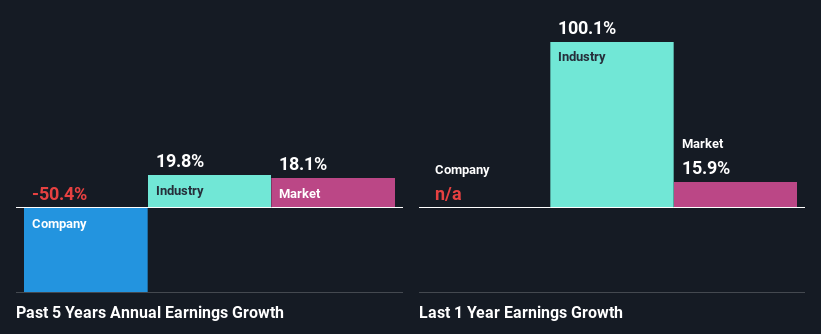Are The Byke Hospitality Limited's (NSE:BYKE) Mixed Financials The Reason For Its Gloomy Performance on The Stock Market?
It is hard to get excited after looking at Byke Hospitality's (NSE:BYKE) recent performance, when its stock has declined 10% over the past week. It seems that the market might have completely ignored the positive aspects of the company's fundamentals and decided to weigh-in more on the negative aspects. Long-term fundamentals are usually what drive market outcomes, so it's worth paying close attention. Specifically, we decided to study Byke Hospitality's ROE in this article.
ROE or return on equity is a useful tool to assess how effectively a company can generate returns on the investment it received from its shareholders. In short, ROE shows the profit each dollar generates with respect to its shareholder investments.
See our latest analysis for Byke Hospitality
How Do You Calculate Return On Equity?
The formula for ROE is:
Return on Equity = Net Profit (from continuing operations) ÷ Shareholders' Equity
So, based on the above formula, the ROE for Byke Hospitality is:
0.7% = ₹11m ÷ ₹1.6b (Based on the trailing twelve months to June 2023).
The 'return' is the yearly profit. So, this means that for every ₹1 of its shareholder's investments, the company generates a profit of ₹0.01.
What Has ROE Got To Do With Earnings Growth?
So far, we've learned that ROE is a measure of a company's profitability. Based on how much of its profits the company chooses to reinvest or "retain", we are then able to evaluate a company's future ability to generate profits. Assuming everything else remains unchanged, the higher the ROE and profit retention, the higher the growth rate of a company compared to companies that don't necessarily bear these characteristics.
A Side By Side comparison of Byke Hospitality's Earnings Growth And 0.7% ROE
It is hard to argue that Byke Hospitality's ROE is much good in and of itself. Even when compared to the industry average of 13%, the ROE figure is pretty disappointing. For this reason, Byke Hospitality's five year net income decline of 50% is not surprising given its lower ROE. We reckon that there could also be other factors at play here. For example, the business has allocated capital poorly, or that the company has a very high payout ratio.
So, as a next step, we compared Byke Hospitality's performance against the industry and were disappointed to discover that while the company has been shrinking its earnings, the industry has been growing its earnings at a rate of 20% over the last few years.

The basis for attaching value to a company is, to a great extent, tied to its earnings growth. What investors need to determine next is if the expected earnings growth, or the lack of it, is already built into the share price. This then helps them determine if the stock is placed for a bright or bleak future. If you're wondering about Byke Hospitality's's valuation, check out this gauge of its price-to-earnings ratio, as compared to its industry.
Is Byke Hospitality Making Efficient Use Of Its Profits?
Byke Hospitality doesn't pay any dividend, meaning that the company is keeping all of its profits, which makes us wonder why it is retaining its earnings if it can't use them to grow its business. So there could be some other explanations in that regard. For instance, the company's business may be deteriorating.
Conclusion
Overall, we have mixed feelings about Byke Hospitality. Even though it appears to be retaining most of its profits, given the low ROE, investors may not be benefitting from all that reinvestment after all. The low earnings growth suggests our theory correct. Wrapping up, we would proceed with caution with this company and one way of doing that would be to look at the risk profile of the business. To know the 3 risks we have identified for Byke Hospitality visit our risks dashboard for free.
Have feedback on this article? Concerned about the content? Get in touch with us directly. Alternatively, email editorial-team (at) simplywallst.com.
This article by Simply Wall St is general in nature. We provide commentary based on historical data and analyst forecasts only using an unbiased methodology and our articles are not intended to be financial advice. It does not constitute a recommendation to buy or sell any stock, and does not take account of your objectives, or your financial situation. We aim to bring you long-term focused analysis driven by fundamental data. Note that our analysis may not factor in the latest price-sensitive company announcements or qualitative material. Simply Wall St has no position in any stocks mentioned.
 Index Options
Index Options Nasdaq
Nasdaq Cboe
Cboe Brooklyn Nets
Brooklyn Nets TradingView
TradingView Wall Street Journal
Wall Street Journal